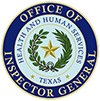Lock-In program helps fight prescription drug abuse
The Texas health care community plays a critical role in preventing prescription misuse through the Medicaid Lock-In Program (MLIP), administered by the OIG. In conjunction with the Texas Prescription Monitoring Program (PMP), MLIP is a resource for pharmacists and prescribers to identify patients who may need help with substance use issues. Through the MLIP, the OIG reviews referrals and data to determine if a Medicaid client meets the criteria for lock-in to a single designated pharmacy or prescriber.
The Medicaid Lock-In Program restricts, or locks, a Medicaid member if it finds 1) the member used Medicaid services, including drugs, at a frequency or amount that is duplicative, excessive or conflicting or 2) the member’s actions indicate abuse, misuse or fraud. The patient data reviewed includes diagnoses, acute care services and prescription drug history. Lock-in determinations are based on several factors, including:
- the number of overlapping or duplicative controlled substance prescriptions;
- using multiple unaffiliated pharmacies and prescribers;
- the number of emergency room visits resulting in opioid prescriptions;
- prescription combinations with abuse potential; and
- treatment that exceeds the daily therapeutic morphine equivalent dose.
The program is designed to combat prescription drug abuse and save taxpayer resources. In fiscal year 2022, the OIG Lock-In Program resulted in $8,080,089 in cost savings to Texas taxpayers. An average of 3,880 clients were locked-in at a given time over the fiscal year. Medicaid clients currently locked-in range in age from nine to over 70; there is no age restriction.
The Lock-In program is not meant to be punitive. OIG nurses help clients understand that ultimately the program is a coordination of care tool that saves lives. It’s a safety net for Medicaid clients who may be exhibiting destructive behavior, but it also helps members understand the potentially harmful – or even fatal – consequences of taking multiple controlled medications together or not as prescribed. Limiting members to one pharmacy allows pharmacists to more closely monitor prescriptions for potential problems that would not be evident if a member uses multiple unaffiliated pharmacies that are unaware of the member’s total prescription intake.
Provider responsibilities
Prescribers must check a patient’s PMP history before prescribing opioids, benzodiazepines, barbiturates, and carisoprodol, although exceptions are made for patients with cancer or in hospice care. According to the Texas State Board of Pharmacy, pharmacies must report all dispensed controlled substances (Schedule II, III, IV and V) to the Texas PMP within one business day of filling the prescription. The prescription histories in the PMP database can identify patients receiving multiple prescriptions from multiple doctors, pointing to evidence of potential doctor-shopping or a misuse of prescription drugs.
In addition to reporting dispensed controlled substances, pharmacists must report any member they think could potentially have a substance use disorder (SUD) or that is attempting to fill controlled substances more frequently than necessary. Once a member has been identified, studying their utilization pattern can help determine whether they should be referred to the MLIP through the OIG’s fraud reporting site.
What should a pharmacist look for? Patterns! Watch for members attempting to fill multiple controlled prescriptions from unaffiliated prescribers, refill prescriptions too soon, or fill prescription combinations with abuse potential.
Making a report
Referrals for Lock-In may come from pharmacists, prescribers, medical providers, managed care organizations, state agencies, law enforcement officials or members of the general public. Reports may be made anonymously, if preferred.
To make a referral, call the OIG’s fraud hotline at 800-436-6184 or visit the OIG’s website, ReportTexasFraud.com, and click the Report Fraud box at the top of the page. For questions or concerns about reporting a Medicaid member to the MLIP, email LockIn_Program@hhs.texas.gov.

